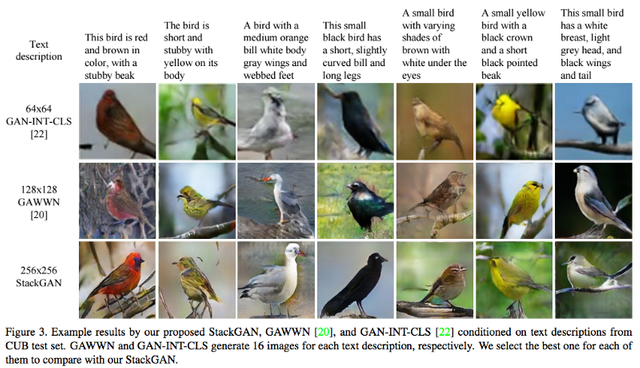I think we can all agree that fake news is a problem. However the time we are in now may be the last time we can be sure that any videos/images and audio are not completely fictional. Recently with the rise of Machine Learning algorithms there have been many studies into generating totally unique audio and visual media. At the moment they are still very limited and experimental but with large corporations like Google and Facebook pouring money into AI research they could make the process more efficient and the product of a better quality.
One of the studies comes from a partnership between Rutgers University, the University of North Carolina at Charlotte, Lehigh University, and the Chinese University of Hong Kong. In this paper they demonstrate how the researchers made a neural network called StackGAN that was able to create images from a descriptive line of text. Since I would not be able to explain it myself here is how they describe it works. “The Stage-I GAN sketches the primitive shape and basic colors of the object based on the given text description, yielding Stage-I low resolution images. The Stage-II GAN takes Stage-I results and text descriptions as inputs, and generates high resolution images with photo-realistic details. The Stage-II GAN is able to rectify defects and add compelling details with the refinement process”. So from this process, the team is able to produce pictures from just text, here is what it looks like.

Image Source
But not only images are being artificially made through machine learning. In this paper the University of Washington’s GRAIL lab creates a machine learning algorithm that can manipulate a target video to lip sync inputted audio different from the original video. They show this off by changing the speech of Obama from the source video to a different speech while also lip syncing the audio. Another example of this is a research project by the Niessner Lab called “Face2Face: Real-time Face Capture and Reenactment of RGB Videos”. In this project the authors created a neural network that could change video of a target actor using a source video in real time.
An example of Face2Face's program in work
Finally there are several tech companies that are creating programs that can upon being trained on an amount of data, can reproduce a target actor’s voice with just text input. One of the companies creating this software is Adobe; its tool called VoCo will be able to reproduce someone’s voice with just 20 minutes of audio data from that actor. The other company is called lyrebird, it says that it can do the same with just one minute of audio data. Either way, this voice, video, and picture manipulation software could defiantly be useful for applications like video games and movies however these programs could be used unethically to create “fake news”.
Solutions
One possible solution for this future problem could be to create a machine learning algorithm that can detect these deep fakes and one lab has already done that. However this could just exacerbate the problem because someone could just use the data from the deep fake detector algorithm and train their neural net to fool that algorithm, making that deep fake generator even more realistic and difficult to falsify. This is how generative adversarial networks (GAN’s) work.
Another solution could be the blockchain. Because the main benefits of a blockchain are that it mathematically verifies data and cannot be changed without a significant amount of work. Possibly, a video app on your phone could be linked with a blockchain and when you record a video a token could be added to the video’s data that could verify its authenticity using the blockchain.
Hopefully by the time this becomes a real problem we will have a solution like this. If anyone has any other ideas about solutions to this problem or wants to point out any errors I have made in this post please put them in the comments, I would love to read them.
Congratulations @makerlbd! You received a personal award!
Click here to view your Board
Do not miss the last post from @steemitboard:
Downvoting a post can decrease pending rewards and make it less visible. Common reasons:
Submit
Congratulations @makerlbd! You received a personal award!
You can view your badges on your Steem Board and compare to others on the Steem Ranking
Vote for @Steemitboard as a witness to get one more award and increased upvotes!
Downvoting a post can decrease pending rewards and make it less visible. Common reasons:
Submit